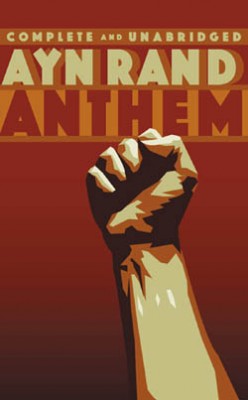Anthem by Ayn Rand
Anthem depicts a world that favours the community over the individual, where its inhabitants speak only as ‘we’ and never as ‘I’. Equality 7-2521 narrates the story, documenting his frustratingly inconsequential role in a society that punishes individuality and rewards conformity.
Each citizen in this regimented colony is assessed from birth and given a particular trade that both benefits the community while simultaneously distracting those with the potential to deviate from the norm. Demanding regimes are put in place to sap energy and suppress illegal thoughts, but nevertheless Equality 7-2521 dreams of one day becoming a scholar so that he may study the intriguing world around him.
But he has been taught that these thoughts are sinful, and he knows that if anyone were to find out about his musings he would be punished immediately so he must remain silent. This could have been bearable if 7-2521 hadn’t discovered something so revolutionary it could change the way he and his people live and view the world, yet dare he tell anyone? Or should he continue his life unassuming and unnoticed despite this thrilling new information that burns inside of him?
Anthem is one of those ingenious pieces of writing that not only makes you feel like kicking yourself for not having read it earlier but also consumes you with envy for its ability to put a complex idea across in a sophisticated yet simplistic way.
Rand was troubled with the idea of communism when writing the novella in 1937, but the underlying message behind her words is not primarily a comment on anti-Nazism. Of course there are very strong themes rejecting uniformity and repression here but this is more of a philosophical standpoint than a political statement. Rand developed her philosophy of Objectivism through her fictional works which incorporated her beliefs that ‘reality exists independent of consciousness’ and that we are essentially responsible for our own destinies and happiness. Anthem is an embodiment of these ideas put forward in delicate, passionate prose.
It seems that in a modern world of faceless online personas, underclasses and young generations consumed with apathy Anthem could not be more relevant. Rand was spot on with her view that a society cannot function smoothly as a whole if its individual inhabitants do not have a sense of identity. There needs to be more emphasis on a happiness brought about by achievements that are separate to the needs of the community, but how can this be achieved? How can we live our lives separate from others yet still feel accepted? How can we be aware of ourselves and our needs without being selfish?




Leave a Reply